Feedback
A few examples of what our clients have to say - more examples can be seen on our facebook page.
Capture
Our tutor was the lovely Lindy Wildsmith, author of several travel and culinary guides and the kind of lady you know you can learn a lot from. I had never made any of the creations on our list but her direction was clear, presenting the process in simple steps and sharing her knowledge along the way. It was also an absolute treat to work in such a spacious and well-equipped kitchen, and with the small class size we were able to spread out and make the most of it.
"Buongiorno Lindy!
Just a quick note to say thank you to you and Sue for a wonderful course last week at Denman. I absolutely loved it and will look forward to making the dishes (and more from the book!) and pursuing the language. You both put such a lot of effort into organising the course beforehand and during the week, and it paid off as it went swimmingly and was seamlessly perfect. Your patience and organisational skills are a wonder! It was the best course I have done at Denman, so very enjoyable."
Vicky Watkins
Cornwall
Pip! Pip! It’s Lindy’s Jam Session
I liked Lindy’s style. She was patient and thorough and fussed around us like a mother hen as we roasted (the beetroot), simmered, boiled, stirred, zested, strained and funnelled up a whole store cupboard of preserves. Everything tasted good. “I’m going to have that raspberry cordial with some gin tonight,” said Faye wickedly. (SAF)
Read More
FERMENTATION COURSE REVIEW: THE SCHOOL OF ARTISAN FOOD
Lindy was a friendly and relaxed host, guiding us through and showing the processes as well as talking to us about the history of preserving, pickling and fermenting. The day moved along quickly as we chopped and salted the cabbage for the Kimchi before introductions were over. We then swiftly prepped (working in pairs – a great way to meet others and network with like-minded foodies) for our German Sauerkraut, Japanese Salt-Fermented (Shio-Fuke) Cucumber, Golden Mango Pickle and, the highlight for me, the Korean Kimchi.
We had prepped most of our veg and fruit before lunch at 1pm, so covered a lot of ground in the three hours. The course is fast-paced but not rushed and (assuming some basic knife skills) is pretty much at a standard that home cooks of any level would feel comfortable with
Read More
In a pickle at the School of Artisan Food
April 23rd, 2017 Review
The School of Artisan Food is located on the Welbeck Estate in Nottinghamshire
"I have attended courses here before, including Breadmaking, Using Herbs, Starting a Food Business, and A Day of Feasting with food historian Ivan Day. I’ve also experienced the School’s fantastic “Food for Thought” weekend of foodie lectures, so I was delighted to take up the invitation to join their first pickling and fermentation workshop.
Our group of picklers met before the course started for a relaxed coffee with homemade bread and marmalade from School’s own bakery, before gathering in the well-equipped and spacious training kitchen. There were around 12 of us, each with our own work station – such a nice group of people, too. As Lindy got us to introduce ourselves it was clear there was no single shared reason why people joined this course: the group included organic farmers, pub owners, restaurant and farm shop owners, charity workers, prospective food entrepreneurs and people who simply love food and cooking. There was also the odd pickler who had been bought the course as a gift for Christmas (I got a feeling the present-giver who came along treated herself at the same time!)
Lindy was a friendly and relaxed host, guiding us through and showing the processes as well as talking to us about the history of preserving, pickling and fermenting. The day moved along quickly as we chopped and salted the cabbage for the Kimchi before introductions were over. We then swiftly prepped (working in pairs – a great way to meet others and network with like-minded foodies) for our German Sauerkraut, Japanese Salt-Fermented (Shio-Fuke) Cucumber, Golden Mango Pickle and, the highlight for me, the Korean Kimchi
We had prepped most of our veg and fruit before lunch at 1pm, so covered a lot of ground in the three hours. The course is fast-paced but not rushed and (assuming some basic knife skills) is pretty much at a standard that home cooks of any level would feel comfortable with.
I do need to mention the catering at the School, which is in another league. All the food served is made fresh on site (and literally in front of us in this case) using as much of their locally grown Welbeck produce as possible, including bread from their own bakery and cheese from their dairy (and depending on your course, beer from the brewery). Today’s lunch was no exception.
Lunch also included breads from Welbeck Bakehouse
After lunch we ruminated on the possible health benefits of gently fermented foods and the positive effect on digestion. We also speculated on why pickling and fermenting is enjoying a renaissance in Britain. Lindy (who herself has the very healthy attitude to food of “eat everything” – a sentiment with which I wholly concur) is convinced the fashion for “clean eating” in the US is responsible for fermented food and drink becoming increasingly popular here. I wonder, though, how much the interest in and knowledge of foods from Eastern Europe – where pickled and fermented foods remain a large part of many of cuisines – has contributed to our revisiting this traditional way of using up a glut and keeping food over winter.
We didn’t use vinegar for any of our preserving on this course, and we had many discussions about the pros, cons and differences between modern vinegars (largely industrially produced) versus the vinegars of the past. Traditionally vinegars were kept fed and nurtured rather like a sourdough starter, so we were all delighted when Alison Parente, a founder of the School, presented us all with a “slice” of “vinegar mother” to take home with us. Yep, this was a first for me. I don’t think I have ever really thought about where vinegar comes from – unless of course presented with a cheap bottle of wine. But there you go, a “vinegar mother” is a vinegar starter – a clump of bacteria that must be fed with wine (a mother after my own heart) to reproduce and ferment. In three months or so we shall have our own gently fermented vinegar to use for pickling or cooking and a vinegar mother who needs a couple of glasses of wine a week to keep her going (I can relate)As ever, the School of Artisan Food delivered a fabulous course – friendly, funny, incredibly interesting and informative, with high quality teaching and, as always, well organised (despite the wobble when we all thought we had added pre-measured sugar to our pickles instead of salt). I can’t rate this place highly enough."
"Thank you so much to Franco and to you for such an enjoyable day today You both made it so enjoyable that I can't wait to start cooking again - though following the amount of food we consumed I think I may have to wait a day or so." Jan Budden
“Perfect timing to receive your newsletter! I'm off on a self catering holiday in the south of France tomorrow so armed with your recipe I will be looking out for some lovely artichokes.” Marion Wills, June 2013
"Myself and Philippa wanted to say a big thank you to you, Alex and all at the Chef's room for making yesterday such a great day. We thoroughly enjoyed our day and have taken so much inspiration and enthusiasm away with us. Although we are still very full!
We hope to see you again soon
All the very Best to you."
Donna Owen
.jpg) .jpg)
This is a quote from coverage generated in the Netherlands for Culy.nl by Lisolotte Legebeke, Editor or www.Culy.nl
"The Chef's Room in Blaenavon was this year awarded the title "Best cookery school in Wales" and is a very nice addition to your visit to Wales. “Culy” attended an afternoon tea workshop with Lindy Wildsmith Cook adn Food Writer Feedback and made the best scones ever, the traditional bara brith which is a loaf cum cake with raisins and candied fruit spread with a thick layer of butter, Welsh Cakes, soda bread and potted crab, while enjoying a glass of bubbly.
The workshop was extremely valuable and especially fun to do. Afterwards we enjoyed all the delicacies we had baked."
.jpg)
"Many thanks for organising another terrific course. Anyone with an interest in cooking should attend one of Franco's courses. Where else could one get so close to one of our great chefs, watch him at work, ask any question and prepare simply wonderful food? And all at such a bargain price. Ten out of ten."
Des Palmer
"We all had a great time at the chef's room and everyone has been busy practising at home cooking lots of lovely foods. Marie and Sam made scones with the young people last night so all our new skills are being put to good use, thank you."
Sarah James, Communities First
French Farm House Cooking
"Had a great day saturday with Lindy. Have thrown away the tin opener and readymade pastry. Kitchen beware.!!!!!!!!!"
Margaret Evans
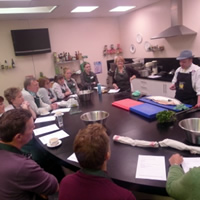 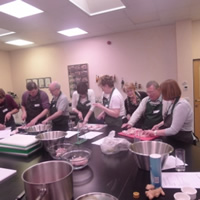 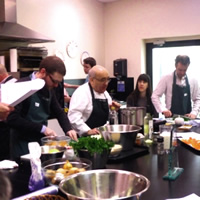
BACK TO TOP
|

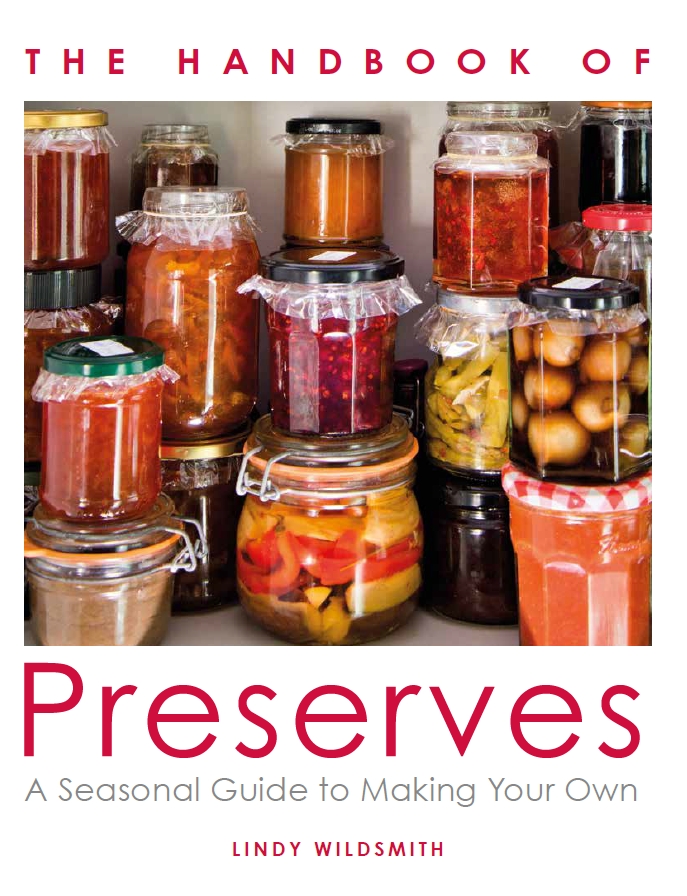

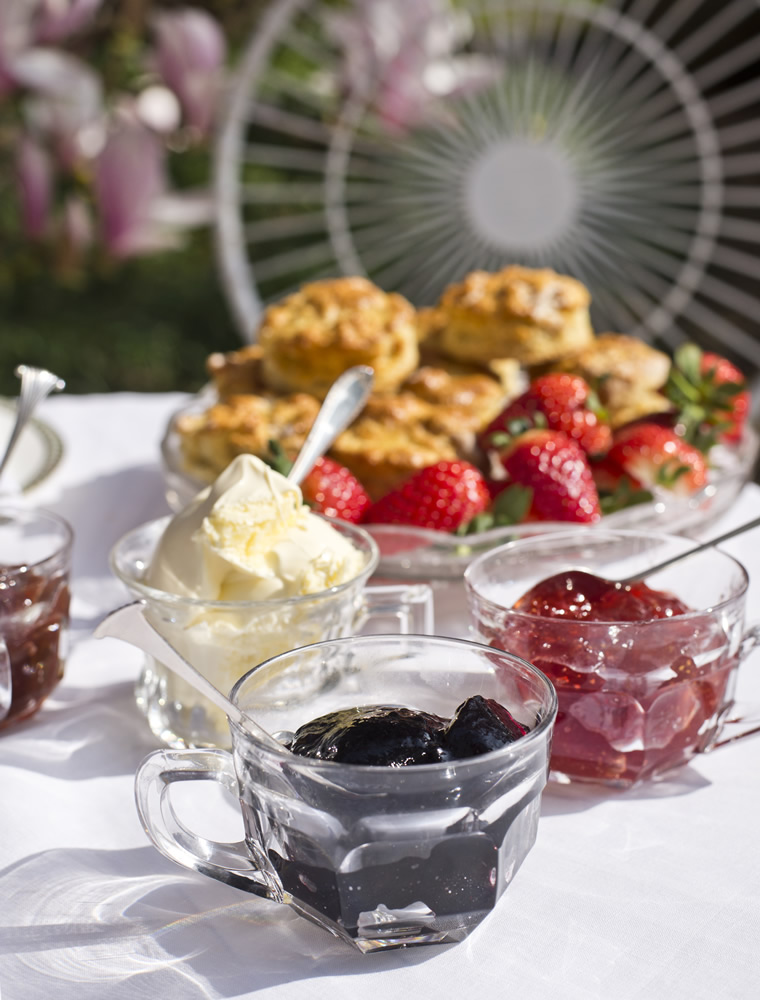
.jpg)
.jpg)
.jpg)


